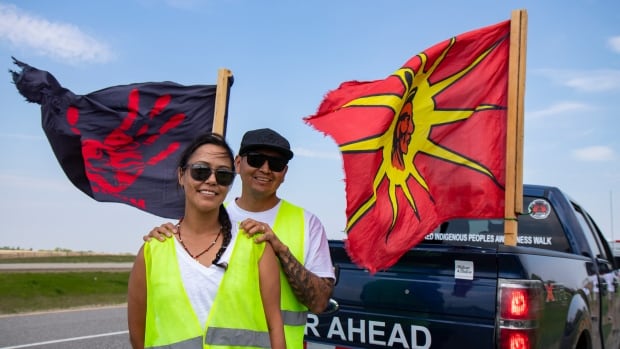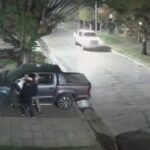Global Courant 2023-05-28 05:20:21
WARNING: This story contains disturbing details.
A newlywed couple walking across Canada hopes to inspire others to join the conversation about missing and murdered Indigenous peoples and push for systemic change.
Charity and Cameron West arrived in Brandon, Man, on Saturday. They’re from northern British Columbia — and for them, the issue hits close to home, Charity said.
Her son Tyrrehz’s father, Barry Blaine Thomas Seymour of Kwadacha Nation, went missing from Prince George, BC in May 2012. Charity said there are still questions.
“We don’t know how it’s not alive,” Charity said. “It completely turns your world upside down…not knowing is the hardest part, or all the scenarios that run through your head.”
Cameron said he and Charity also live along the Highway of Tears, a 450-mile stretch of Highway 16 in northern BC where RCMP says 18 girls and women have been missing or killed since 1969 — though Indigenous leaders say the number is closer. up to 50.
The couple married in October and set off on their Canada trip in early May.
On the first leg of their journey to St. John’s, Nfld., each step is a reminder of the losses of those who were killed or missing, Cameron said. The second part of their walk will honor the lost along the Highway of Tears and take them from Prince Rupert to Prince George in BC
Cameron and Charity say their goal is to push for grassroots change by sparking conversations about missing and murdered Indigenous people in Canada. (Chelsea Kemp/CBC)
“There are a lot of miles, so you go through a lot of emotions… We both lost a lot of family members,” said Charity. “It’s been really tough. So you go through all those emotions, there’s all that sadness, and then you miss home.”
While visiting Brandon, they participated in CFB Shilo Indigenous Peoples awareness week and will be part of a celebration for missing and murdered Indigenous women and girls and a ceremony on Sunday at the Riverbank Discovery Center.
Florence Halcrow of Brandon’s Ask Auntie said the outreach group has supported the couple’s mission since meeting them in Regina.
“We have so many people, so many of our women and men going missing and being killed,” Halcrow said, adding that this includes the 2022 murder of mother Tessa Perry in Winnipeg, who had ties to Brandon.
Florence Halcrow of Brandon’s Ask Auntie says the outreach group has supported the couple’s mission since meeting them in Regina. (Chelsea Kemp/CBC)
Halcrow hopes Brandon will spark the national conversation about the impact of missing and murdered Indigenous peoples in Canada.
“It’s certainly very important[to]provide support to our Indigenous people who are walking through it and trying to raise awareness among others,” Halcrow said. “Every community has some kind of murdered and missing indigenous people.”
Conversations begin
Charity and Cameron want their walk to spark hard conversations about the crisis and encourage non-Indigenous people to participate in these discussions.
They said they are supported by the Tsay Keh Dene First Nation, Kwadasha Nation, Takla Lake Nation and Lake Babine Nation in British Columbia.
Charity said they often talk to non-Indigenous people who want to support and engage in these conversations but find it difficult because they don’t want to offend anyone.
For Charity, these connections are an opportunity to talk about their lived experiences, helping people better understand the loss and trauma that comes when someone is killed or missing.
Terryn Mecas, left, joins Charity and Cameron on their walk. (Chelsea Kemp/CBC)
Cameron said he hopes they inspire other walks, conversations and collaborations around the country.
While Canada has established high-level actions such as the Truth and Reconciliation Commission and the National Inquiry into missing and murdered Indigenous women and girls, it’s hard to see any immediate changes happening in their community, Charity said.
The final report of the investigation was released in 2019 and featured sweeping calls for change. It found that Indigenous women and girls are 12 times more likely to be murdered or missing than members of any other demographic in Canada.
At least 28 Indigenous women in Manitoba have been killed by violence since May 2020, Sandra DeLaronde, team leader of the Manitoba MMIWG2S deployment team, said earlier this month.
And in a report last year, Statistics Canada said 63 percent of Indigenous women have experienced violence and nearly half have experienced sexual violence.
“We’re living it. We’re not seeing the follow-up,” said Charity. “We can do better – everyone can do better.”
If you or someone you know needs immediate emotional help, call 1-844-413-6649. This is a national, toll-free 24/7 crisis hotline that provides support to anyone in need of emotional help related to missing and murdered Indigenous women and girls.




